This article was medically reviewed by Luba Lee, FNP-BC, MS and by wikiHow staff writer, Janice Tieperman. Luba Lee, FNP-BC is a Board-Certified Family Nurse Practitioner (FNP) and educator in Tennessee with over a decade of clinical experience. Luba has certifications in Pediatric Advanced Life Support (PALS), Emergency Medicine, Advanced Cardiac Life Support (ACLS), Team Building, and Critical Care Nursing. She received her Master of Science in Nursing (MSN) from the University of Tennessee in 2006.
There are 11 references cited in this article, which can be found at the bottom of the page.
This article has been viewed 11,106 times.
Dramamine, otherwise known as dimenhydrinate, is a drug that helps you feel less motion sick. Although it’s simple to take, this medicine tends to make you feel sleepy, and should only be used in the correct circumstances. If you’re an adult, take one or two pills of the original or non-drowsy pills a little bit before you plan on traveling. If a child is motion sick, give them some kid-friendly Dramamine before going on a trip. If it’s difficult for you or a loved one to travel without feeling sick, see if Dramamine can help!
Steps
Having Adults Take Dramamine
-
1Take one or two 50 mg tablets 30 minutes before traveling if you’re over 12 years old. Plan ahead by taking your Dramamine dosage at least 30 minutes before using any mode of transportation. If your motion sickness tends to be on the mild side, opt for just 1 tablet. If you tend to feel dizzy and nauseous easily, opt for 2 tablets instead.[1] When you’re packing your Dramamine ahead of time, decide whether you want to pack a travel capsule, which comes with 12 tablets, or a larger bottle, which comes with 36 tablets.[2]
- If you aren’t a fan of swallowing your medication, try Dramamine Chewables instead.
- You can take Dramamine with or without food.[3]
- Don’t take an adult dose if you’re under 12 years old. If a child does have an accidental overdose, contact a Poison Control Center or seek medical help.[4]
- Use caution while driving a motor vehicle or operating machinery after taking Dramamine since it can cause you to feel drowsy and be less focused.
-
2Opt for non-drowsy tablets if you don’t want to feel tired. Swallow one or two 25 mg tablet of All Day Less Drowsy Dramamine if you don’t want to deal with any of the drug’s sleepy side effects. Take the medication about 30 to 60 minutes before you start traveling, as this allows the drug to be more effective. Since this drug is designed to work all day, only take one dose unless your doctor tells you otherwise.[5]
- This version of the drug is designed to make you feel less tired, so the dosages are a little smaller.
- Always check the drug label before taking a medication. Whenever you use Dramamine, don’t take more or less than the recommended dose.
Advertisement -
3Wait 4-8 hours before taking another dose of Dramamine. Let a few hours pass before you take any more medication. If you’ve been taking the original 50 mg pills, wait at least 4 hours before using any more tablets. Users of the All Day Less Drowsy Dramamine are directed to only take 1 dose per day.[6]
- Immediate Release users shouldn’t take more than 400 mg per day, while Extended Release users shouldn’t take more than 300 mg.
-
4Avoid drinking alcohol after you take Dramamine. Don’t drink any alcoholic beverages after taking a dose of Dramamine, even if you don’t plan on driving or piloting any vehicles. Since alcohol tends to amplify the side effects of Dramamine, you might feel extra tired and drowsy. When you combine alcohol with this drug, you also raise your risk of overdosing.[7]
- The most common signs of a Dramamine overdose are dilated pupils, extreme tiredness, lack of balance, and difficulty swallowing. In more severe cases, hallucinations and seizures can occur.
Giving Dramamine to Children
-
1Give children under age 6 one or two 12.5 mg tablets by mouth before traveling. Offer young children especially prone to motion sickness some kid-friendly Dramamine. On a day you plan to travel, wait about an hour before departure to give a child any tablets. Once a child takes a dose, check that they’ve completely chewed and swallowed the tablet.[8]
- Dramamine for children is designed to be easy to eat.
- Don’t give children any Dramamine Chewables for adults, as these have a higher dosage.
- While you don’t have to talk to a pediatrician to give Dramamine to children over age 2, contact a medical professional if your child has intense nausea or vomits a lot when traveling.
-
2Have kids between ages 6 and 11 take one or two 25 mg tablets before a trip. Give older children 1-2 low dosage chewable tablets to prevent them from being motion sick. About 30 to 60 minutes before traveling, have the child completely chew and swallow the entire tablet. If your child gets especially ill when traveling in a moving vehicle, have them take 2 tablets, instead.[9]
-
3Don’t give babies Dramamine unless your doctor tells you to. Check with your doctor if you have an infant or toddler who suffers from motion sickness. If your doctor gives you the go-ahead, give your young child the directed dosage of kid-friendly Dramamine.[10]
- Other brands make liquid versions of dimenhydrinate. Talk to your doctor to see if that would be a good option for your young child.
- If you want to go a more natural route, opt for remedies like ginger or aromatherapy.[11]
Warnings
- Don’t take Benadryl and Dramamine at the same time.[16]⧼thumbs_response⧽
- Don’t use Dramamine if you have an allergic reaction to it.⧼thumbs_response⧽
- Talk to a doctor or pharmacist before taking Dramamine if you have liver or kidney disease; enlarged prostate; heart disease or high blood pressure; a history of seizures; a blockage in your digestive tract; an overactive thyroid; glaucoma; or breathing disorders, such as asthma or bronchitis.[17]⧼thumbs_response⧽
- For some people, Dramamine makes their motion sickness symptoms worse. Avoid this medication if you deal with any headaches, dizziness, or nausea after taking it.[18]⧼thumbs_response⧽
- Call the Poison Control phone number if you think you’ve taken too much Dramamine at once. You can reach them at 1-800-222-1222. If your overdose feels life-threatening, call 911.[19]⧼thumbs_response⧽
References
- ↑ https://medlineplus.gov/druginfo/meds/a607046.html
- ↑ https://www.dramamine.com/motion-sickness-medicine/dramamine-original-formula
- ↑ https://www.drugs.com/mtm/dramamine.html
- ↑ https://dailymed.nlm.nih.gov/dailymed/drugInfo.cfm?setid=4139b5bf-2e49-40c3-9f4a-d8e15c044ead
- ↑ https://www.dramamine.com/motion-sickness-medicine/dramamine-less-drowsy
- ↑ https://www.drugs.com/dosage/dimenhydrinate.html
- ↑ https://www.alcohol.org/mixing-with/motion-sickness-medications/
- ↑ https://www.empr.com/drug/dramamine/
- ↑ https://www.empr.com/drug/dramamine/
- ↑ https://medlineplus.gov/druginfo/meds/a607046.html
- ↑ https://childrensmd.org/browse-by-age-group/toddler-pre-school/traveling-without-vomit-treat-motion-sickness-kids/
- ↑ https://childrensmd.org/browse-by-age-group/toddler-pre-school/traveling-without-vomit-treat-motion-sickness-kids/
- ↑ https://www.mayoclinic.org/first-aid/first-aid-motion-sickness/basics/art-20056697
- ↑ https://www.dramamine.com/motion-sickness-medicine/dramamine-non-drowsy-naturals-ginger-for-motion-sickness-pills
- ↑ https://www.drugs.com/dosage/dimenhydrinate.html
- ↑ https://www.drugs.com/mtm/dramamine.html
- ↑ https://www.drugs.com/mtm/dramamine.html
- ↑ https://medlineplus.gov/druginfo/meds/a607046.html
- ↑ https://medlineplus.gov/druginfo/meds/a607046.html
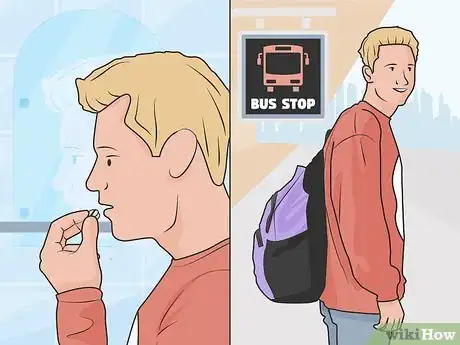
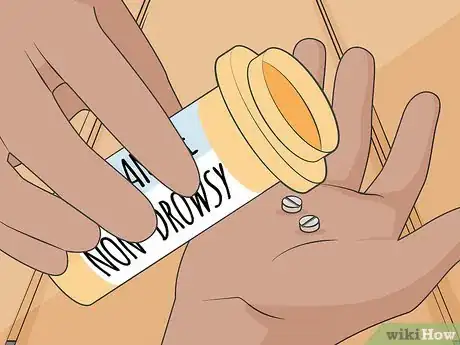
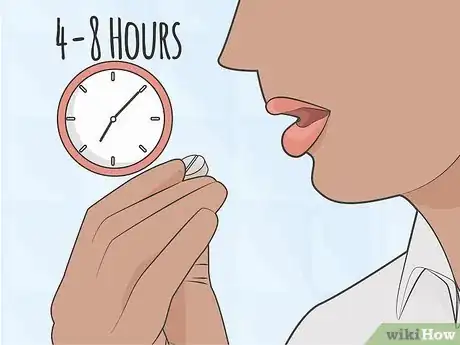

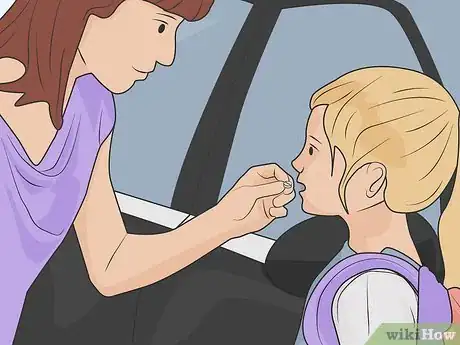

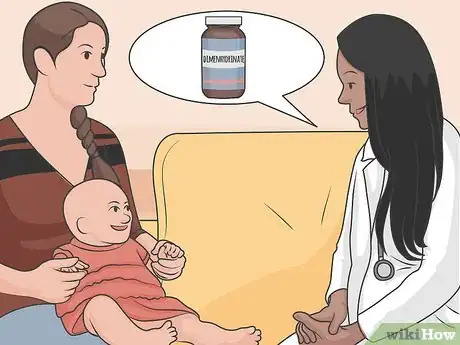

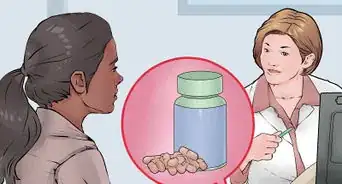
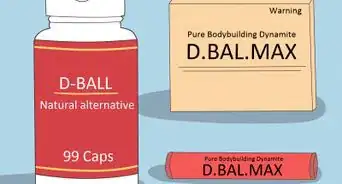

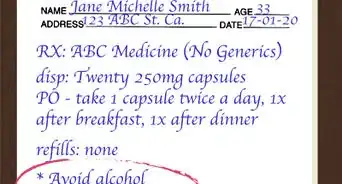
-Step-17-Version-3.webp)


-Step-23.webp)
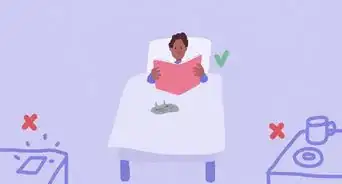



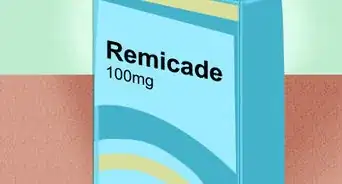









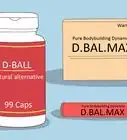




































Medical Disclaimer
The content of this article is not intended to be a substitute for professional medical advice, examination, diagnosis, or treatment. You should always contact your doctor or other qualified healthcare professional before starting, changing, or stopping any kind of health treatment.
Read More...